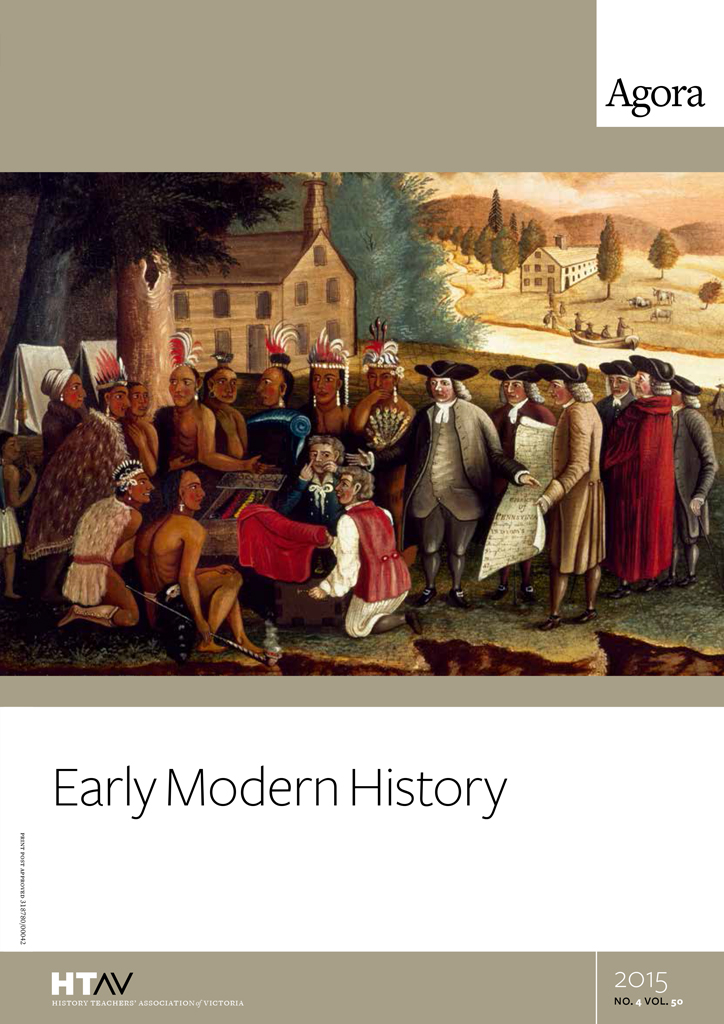Contents
Editorial | Alan Tiller
President’s Introduction | Ashley Wood
Sungrapho
Thinking Historically in the Immigration Museum | Amy McKernan
How does the Immigration Museum foster historical thinking?
Thema
Atlantic History: A Rubric for Teaching | Dr Kit Candlin
In understanding the age of globalisation, the study of regional histories, such as those of the Atlantic world from the fifteenth to mid-nineteenth centuries, have an important part to play in the way we as historians construct the larger whole.
The Ottoman Empire and the Early Modern World | Assoc. Prof. Mesut Uyar
At its height the Ottoman Empire occupied an area that stretched from the Mediterranean to the Caspian Sea and from Poland in the north to the Indian Ocean in the south. Its success was based on strong and well-organised military and administrative structures, the control of trade routes and a diverse mix of geography, population and cultures.
The Revolution in Human Thinking in the Eighteenth Century: Teaching the Enlightenment | Dr Michael Adcock
The aim of teaching the Enlightenment to students is to make them realise that this intellectual movement in eighteenth-century Europe created the very foundations of the liberal democratic societies in which we live today.
Global Empires: Starting Your Voyage of Discovery | Ashley Keith Pratt
This article explores the growth of global empires in the early modern period, their significant features and ways of integrating key procedural concepts into an effective VCE Global Empires teaching program.
Hetman Ivan Mazepa and the Battle of Poltava (1709) | Andrew A. Pyrcz
Who was Hetman (i.e. Cossack leader) Ivan Mazepa and what was the historical and geopolitical significance of the Battle of Poltava fought three centuries ago?
The Rise and Decline of the Venetian Empire | Anne McIlroy
At its height, the Venetian Empire was a leading maritime power and a key player in international trade. The decline of Venice at the end of the fifteenth century gave way to the trading empires of Spain, England and the Netherlands.
Europe and the Americas at War in the Mid-Eighteenth Century: Land, Religion and the Modern State | Andrew Doyle
The Seven Years’ War was the first global war – the conflict encompassed the great powers of the time over three continents and changed the balance of power in Europe and the Americas.
The Spanish Conquest of the Americas (c. 1492–1572) | Phillip O’Brien
The Spanish Conquest of the Americas is a rich, rewarding and relevant study in the early secondary years.
Global Empires: Ten Ideas to Get You Started | Greg Edwards, Connor Bourke, Lauren Cape, James Wolff and Alexandra O’Connor, with Dr Catherine Hart
Ten ideas to assist teachers plan and prepare for the new VCE Global Empires units.
Teaching VCE Global Empires: Using a Flipped Classroom Approach | Elisa A. Litvin
A brief outline of suggested pedagogy and strategies for the new VCE Global Empires course.
Teaching the Polynesian Expansion Across the Pacific: A Unit of Work | Johanna Petkov
The Polynesian Expansion Across the Pacific is a study full of potential in terms of exploring historical concepts and cross-curriculum priorities.
Reviews

